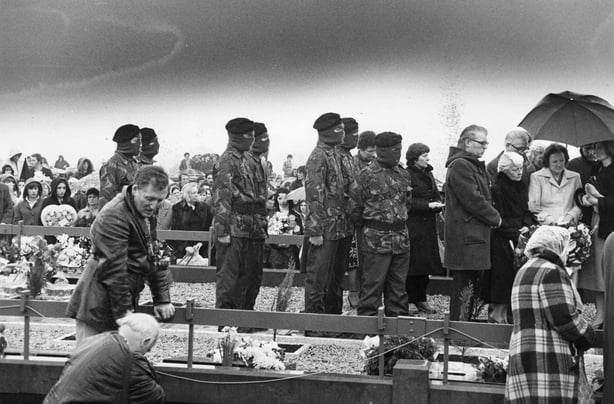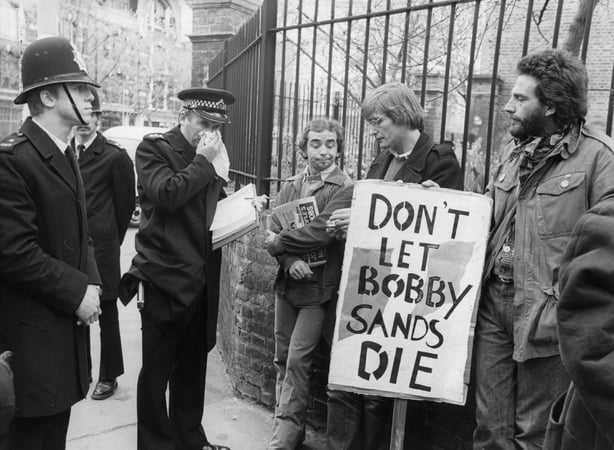The director of a new film about the life of hunger-striker Bobby Sands, 66 Days, has said he expects there to be a knee-jerk reaction from people before they even see the documentary. However despite the sensitive subject matter Brendan J Byrne hopes that people will judge the film on its own merits.
Despite growing up up in a working class Catholic community in North Belfast Byrne realised he knew very little about Sands. "Bobby Sands - he’s a big name, but I do I know anything really about him more than the gable wall picture?” With that stray thought in his head, he embarked on his film project, 66 Days, a moving document of the life of the iconic hunger striker who died, aged 27, in 1981.
He had seen Steve McQueen’s film Hunger which he liked, but he reckons it could have been the story of any of the hunger strikers in that fateful year in the North. In fact he felt that there was a "narrative deficit" in the Bobby Sands story. "I thought I should know more, so I set out on a quest to update the Bobby Sands story and bring it to the modern contemporary audience", he said.
He was 15 years of age and attending school in West Belfast when Sands embarked on his hunger strike. He would take the bus and see crowds of people on the streets of the city each day. "So it was going on in my peripheral vision. I knew it was happening, I knew it was a seismic moment, I couldn’t fully articulate it." As the 50-year-old that he now is, he was finally prompted to make the film about "what he could not articulate all those years ago, from the window of the bus."
He recalls tension on the streets at the time, "the fear, a real sense of foreboding. What’s going to happen - the clock was ticking down and you knew the clock was really going to stop with deaths. So I was lucky enough to live in a great family and when you closed that door, you were shielded from the worst excesses of the world outside – when you opened that door again you knew you were living in different times."

Brendan J Byrne, director and producer of 66 Days
He considers his film to be the first to deal solely with Bobby Sands. "(He) died in 1981, the conflict didn’t end until 1998, so in that whole period these two opposing forces were still at war. So there wasn’t a time to eulogise or mythologise someone, there wasn’t a time to spread a story of who this guy was, the conflict was still ongoing.
"Then when you have peace, the narrative changes, so you don’t have much more than the picture on the gable wall and there was never an opportunity to fill in the blanks. In the fog of war there are a lot of narrative casualties and Bobby Sands was perhaps the greatest of them."
Watch Paddy Kehoe's interview with director Brendan J Byrne by clicking the video link.
"If I had been trying to make the film ten years ago, it might have been more difficult," he recognises, because the people who finance movies might have been less comfortable. "But now with the period that has elapsed there is a feeling that perhaps the issue is a little less sensitive. I think people can go and look at the film and start challenging their own deeply-held narratives, which sometimes have been handed down generations. So there was more of an openness now to tackle it whilst the funding bodies still have a level of sensitivity to the portrayal of the story."

IRA members in combat jackets, masks and berets at the burial of Bobby Sands MP
BBC Northern Ireland are one of the producers of 66 Days and Byrne believes the broadcaster would have felt it was a risk due to residual bitterness that still lingers in the North. "They embraced that risk, they have been very brave to back us with the film."
He knows well that there might be people queuing up to be critical of the film. "A film about somebody who has the strength of belief to take their own life cannot be anything other than moving," he says. However, his aim was to make 66 Days "sufficiently moving to be human and empathetic, without you trying to over-emote the audience. So it’s a delicate balance to traverse. One or two voices will probably damn it without saying it, there’s still some negative, kneejerk reaction that can happen up in the North."

British policemen with IRA sympathisers during a May Day march in London in May 1981
Byrne is pretty confident that with the passage of 35 years since Sands' death, there will be a reasonably measured, intelligent response to the film. "As long as the film is talked about in terms of a film, then I can talk about it all day. But when people use it as a platform to describe their own political ideas then, you know they’ve lost the argument.”
The film, which goes on release this week, marks the 35th anniversary of the Hunger Strike and the 100th anniversary of the 1916 Rising. "1916 and 1981 are the umbilical cords of the Republican tradition in Ireland in the 21st century," says the director.
"1981 couldn’t have existed without 1916, they’ve both defined the half of the century they were in. In the film you can see in Bobby Sands writings, he’s thinking back to 1916, he’s thinking back to previous hunger strikers from a different tradition."
66 Days is reviewed here and goes on release on August 5.

